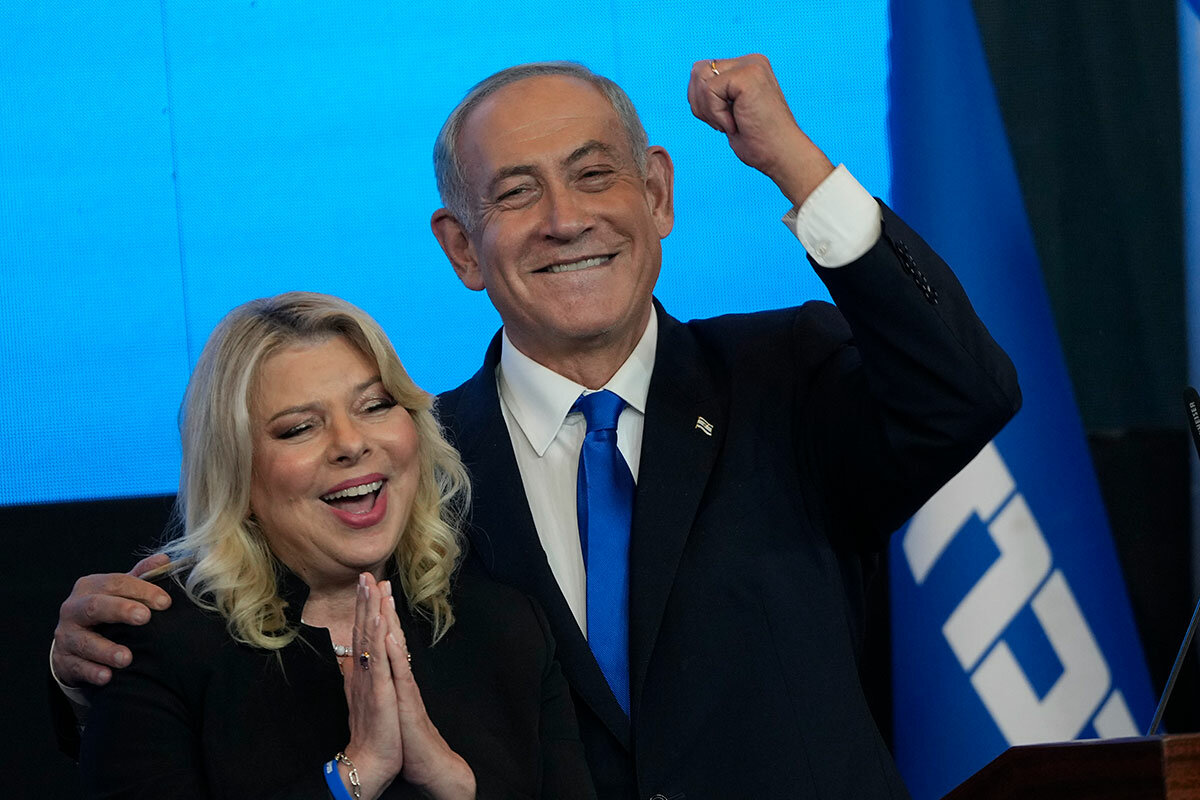For Israel’s hard-right alliance, how high a priority is democracy?
Loading...
| TEL AVIV, Israel
In the context of the Israeli president’s mostly ceremonial role, which is not supposed to drift into partisan politics, Isaac Herzog’s remarks Thursday to Itamar Ben-Gvir, head of the Jewish Power faction of the Religious Zionism party, bordered on a lecture.
The two were meeting as part of the post-election procedure in Israel, wherein the president confers with leaders of incoming parliamentary factions before choosing who is given the mandate to form the next government.
After the recent general election, it is already well known, that person will again be the long-serving Benjamin Netanyahu, who has spent the last 16 months as leader of the opposition.
Why We Wrote This
Ousted from office 16 months ago, Benjamin Netanyahu embraced the invective of his ultranationalist allies. It worked. At stake as he negotiates a new coalition are issues central to Israel’s democracy: minority rights, security laws, and an independent judiciary.
President Herzog was blunt with Mr. Ben-Gvir, who has been convicted of incitement and as a lawyer has defended extremist settlers charged with violence against Palestinians.
“There is a certain image of you and your party that causes concern in many places regarding the treatment of Arabs and Muslims in our country,” he told Mr. Ben-Gvir. “In the end there is a country to manage; it is Jewish-democratic, egalitarian, and believes in both human and civil rights.”
Mr. Ben-Gvir protested his innocence, but his next stop after the President’s Residence did nothing to dispel the concerns: a visit to a memorial ceremony honoring the late Meir Kahane, an anti-Arab Jewish ideologue whose party was once outlawed in Israel for its racist invective.
Netanyahu’s path back
With the help now of Religious Zionism and two ultra-Orthodox parties, Mr. Netanyahu, leader of the Likud party, is set for a dramatic return to power at the helm of a far-right government. This “Netanyahu bloc” secured a four-seat majority in the early November ballot, the country’s fifth election in under four years.
The cabinet posts and coalition policy agenda are still to be negotiated, but Religious Zionism is already setting the tone: Jewish supremacism and religious piety are taking precedence over Israel’s more liberal and pluralistic traditions.
In the new government’s crosshairs are also the independence of Israel’s Supreme Court and other legal institutions, which if undermined, analysts contend, could remove any checks on the new government
The seeds of Mr. Netanyahu’s comeback were planted over a year ago as he desperately tried to cling to power. Following the previous election in March 2021, Mr. Netanyahu made every effort to secure the support of an Arab-Israeli Islamist party for his next governing coalition. The move was scuttled by his purported partners in Religious Zionism, an alliance of Jewish ultranationalist factions that he had just personally engineered.
Denouncing any effort to include an Arab-Israeli party in a coalition,��Religious Zionism head Bezalel Smotrich said he would “not lend a hand to the suicide of the Right and the State of Israel” in seating a government “dependent on the support of anti-Zionist terror supporters [who] make all of us their hostages.”
The anti-Netanyahu camp – made up of centrist, leftist, and some nationalist parties –��then��seized the opportunity to form its own coalition with the Arab party, Ra’am.
“Netanyahu should have known better than to think he could control these extremists,” one official from this camp said at the time.��
With the ascent of a broad government headed by Naftali Bennett, a solidly right-wing pro-settlement leader who had long been part of Mr. Netanyahu’s bloc, the deposed prime minister��quickly pivoted to embrace the invective of the far-right.
In speeches and social media campaigns and at Likud-organized rallies, Mr. Netanyahu and his supporters amplified the message that the serving Israeli government was “illegitimate,” “weak and leftist,” and dependent on “Muslim Brothers” and “terrorist supporters.”
The dog-whistles and populism resonated.��
“Our country was kidnapped in an illegal way,” said Yossi Bezalel, a right-wing demonstrator in Jerusalem in June 2021. “We’re going to take our country back and defend our honor.” At a protest in Tel Aviv a few months later, ultranationalists demanded a “Jewish government for the Jewish State.” And this year, at a provocative march near Jerusalem’s Old City, Mr. Ben-Gvir termed the Israeli government a “Hamas government,” referring to the Palestinian militant group.
Mr. Netanyahu and the far-right rode this wave of incitement to election victory.
This��“rhetoric of religious-nationalist supremacy ... puts the Jew above any human value��[and] doesn’t give any humanist association to something that is not Jewish,” says Mohammad Darawshe, an expert on Jewish-Arab relations in Israel. “And now they’re in power.”
Helping Mr. Netanyahu’s alliance were lingering tensions from widespread intercommunal riots in mixed Jewish-Arab cities in May 2021, during a round of fighting in Gaza. The unrest, at the tail end of Mr. Netanyahu’s last term, was fueled in part by the presence of Mr. Ben-Gvir and extremist Jewish gangs at flashpoints in East Jerusalem and central Israel.
In from the fringe
Until recently, Mr. Ben-Gvir and his Jewish Power faction were viewed as fringe players in national politics. Successive efforts to win a seat in parliament failed, until Mr. Netanyahu began brokering far-right alliances to maximize their vote share and bolster his own electoral prospects.
“Netanyahu was very dominant in the design of the extreme right in Israel,” says Professor Gayil Talshir, a political scientist at Jerusalem’s Hebrew University. “He gave legitimacy to them politically and publicly. ... He created this phenomenon.”
Today, Jewish Power’s platform calls for the “emigration” of “Israel’s enemies” to their “countries of origin”; settlement construction on the entirety of the Land of Israel, including all of the West Bank; the embedding of “Hebrew Law” in the country’s legal system; and the reclaiming of “sovereignty and ownership” over Jerusalem’s Al-Aqsa Mosque compound, known to Jews as the Temple Mount.
“We do not want to lose the Jewish State neither in war, nor in peace, nor through Western democracy,” the platform reads.
“Jewish supremacy and power are their own terms, and it describes them well,” Professor Talshir adds. “For them Jewish nationhood supersedes the State of Israel.”
Mr. Ben-Gvir also played on real fears of growing crime and violence in Israel’s southern Negev and northern Galilee regions – mainly from Arab organized crime families – to burnish himself as the candidate that can “restore governance” and “personal security” to these and other areas.��
Much of Religious Zionism’s surge in support, pollsters maintain, came from Jewish Israelis drawn to Mr. Ben-Gvir’s “law and order” platform. He again promised supporters recently that he would “untie the hands of our soldiers and police officers,” including loosening the rules for the use of live fire against Palestinians.
He is now demanding, and may likely get, the Internal Security ministry in the next Netanyahu government – a cabinet post with responsibility for the National Police.
“There will be a lot of needless collisions [between Jews and Arabs], which will be enflamed on purpose by Ben-Gvir even by his mere presence at specific events,” Mr. Darawshe predicts. “Any senior police official that wants to get ahead will break rightward in order to appease the minister.”
Status of the judiciary
Since his electoral victory in early November, Mr. Netanyahu in his few public remarks has attempted to convey a message of calm and unity to both the Israeli public and the international community.
Yet analysts maintain that he is dependent on Religious Zionism not only to form his next government but also to pass a sweeping “judicial reform” agenda that could see the independence of the Supreme Court, attorney general, and other legal institutions quashed.
“The entire system, all the authority of the Supreme Court, the separation of powers between the government branches, the checks and balances – there’s no guarantee of anything here, because there’s no constitution. You just need 61 votes [in parliament, out of 120 seats],” says Dr. Amir Fuchs, a senior researcher at the Israel Democracy Institute, a nonpartisan think tank.
The Israeli Right has long viewed the country’s judges and legal officials as overly activist.��The judiciary has often struck down��legislation and government decisions deemed illegal – including on issues like settlement construction in the West Bank, the forced deportation of African economic migrants, or the civil rights of Arab Israelis.
Mr. Netanyahu may use the above “reforms” to effectively halt his ongoing corruption trial for bribery, fraud, and breach of trust, analysts say.
“Religious Zionism has Netanyahu right where they want him. He needs them,” says Professor Talshir. “He may think he can control them, but they control him. The ideological engine of this government is them, not him.”
There have been some efforts to make the ideology more palatable. On Nov. 7, Mr. Ben-Gvir penned a full-page op-ed in the rightwing��Israel Hayom��addressed to “my brothers on the left.”
“I’ve matured, I’ve become more moderate and I’ve come to understand life is more complicated,” he wrote. “All of us need personal security. … And yes, the Arab citizens of Israel are also entitled to protection and to feeling safe.”
Yet��later that same day, he tweeted a picture of a prominent Arab Israeli parliamentarian at the Tel Aviv airport heading to make a flight. “It’s about time! May we be blessed with such good news only and that they never come back here,” he wrote.









